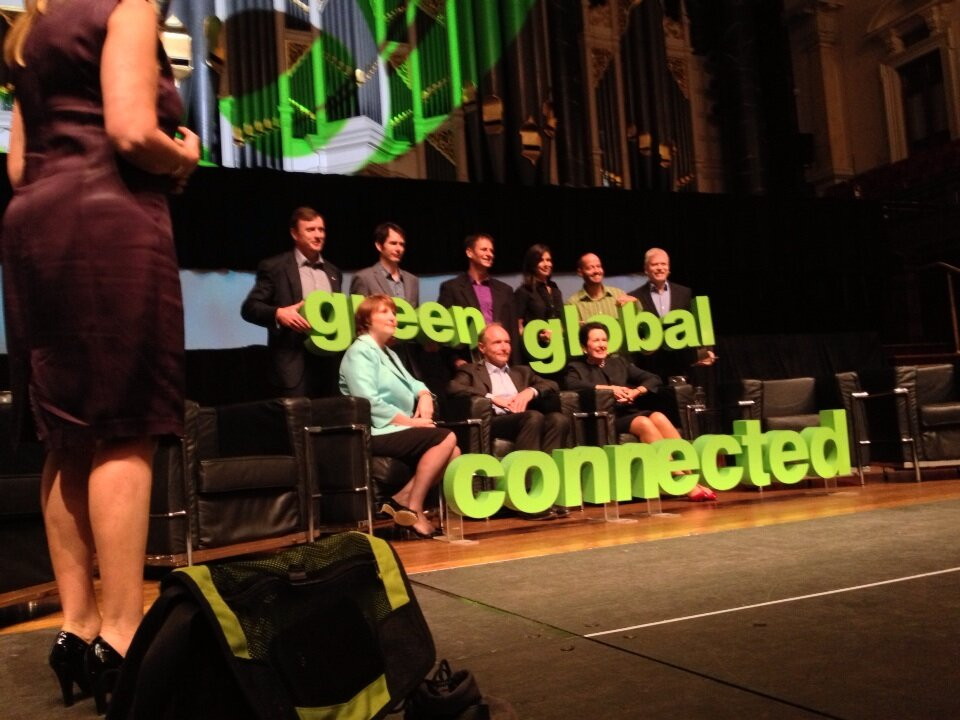Berners-Lee, Silicon Valley, and Australia's cultural cringe

Without doubt, the man who effectively invented the world wide web is smart. Berners-Lee downplays his role.

"Most of the technology involved in the web, like the hypertext, like the internet, multifont text objects, had all been designed already. I just had to put them together," he said in 2007. But he's done a lot more than invent the core protocol of HTTP and now heads up MIT's storied Computer Science and Artificial Intelligence Laboratory.
So what did we ask him about during his visit? What comments scored the loudest rounds of applause? Whether our National Broadband Network was a good idea. Yes, it is. Whether data retention was a good idea. No, it isn't. And that ever-favourite geek issue, whether you've got root on your device.
As usual, we wanted the visiting celebrity to pat us on the head for making the right choices, and to confirm that we're believing the right beliefs to maintain our places in the global geek-tribe.
The most embarrassing moments involved Sydney's Lord Mayor, Clover Moore. Having already larded Berners-Lee's Sydney Town Hall appearance with a conga line of hangers-on, presumably hoping to gain geek cred through osmosis, she then had the poor bloke sit with them all for a group photo, holding the words "green", "global", and "connected". How provincial.
OK, I'm a hypocrite. I wrote that got-root article without shame, and I daresay that when my video interview with Berners-Lee for tour sponsor iiNet appears next week, you'll see some embarrassing kowtowing. But journalists and editors know which stories will generate the clicks: those that pander to Australia's cultural cringe.
"The cultural cringe can be expressed in the almost obsessive curiosity of Australians to know what foreigners think of Australia and its culture," Wikipedia puts it. Quite.
The cultural cringe manifests itself in another way: Australians' oft-expressed hope to create our own Silicon Valley. Well, it ain't going to happen, folks — not unless we drop through a wormhole and become the centre of a World War III that took place in the 1970s.
The forces that shaped Silicon Valley are unlikely to come together anywhere else.
Stanford University saw the development of the US West as part of its mission, and during the 1940 and 1950s, encouraged graduates to start their own companies. The West Coast had been awash with defence funding during World War II and the early Cold War, and with veterans such as radar technicians who'd learnt about electronics during those conflicts.
There was a strange cultural collision, too. On the one hand, there was the freedom-loving hippie counter-culture. On the other, another kind of freedom-loving in the solipsistic geek followers of Ayn Rand — a story beautifully told in Adam Curtis' three-part documentary,All Watched Over By Machines Of Loving Grace.
The US also has rather different bankruptcy laws that are more tolerant of risk-taking than Australia's. But my money's on the Valley's unique amalgam of cultures, defence dollars, and supportive institutions. We'll never replicate that.
In any event, why would we want to? For all its success, the Valley's Randroid influences have led to what I've previously called the "Evil Cult of the Internet Startup".
The Cultists truly believe that the faster-faster-VC-to-IPO chase to these glorious riches is the right and proper thing to do — and like all zealots, they think the ends justify the means.
The Cult of the Internet Startup is evil. It's selfish. It's inhuman. It's amoral. Using the term "work ethic" to describe driving (or seducing) people into appallingly long work hours to the neglect of family and community, and even self, is disgusting.
This is not the only way of starting a new business. It's just one specific model — about fast growth and high risk. Without a doubt, it can sometimes produce astounding results. It can also crash spectacularly, leaving no survivors.
The key question is whether Australia, with its unique culture, really needs to copy a different one, or whether it can build on its own strengths in its own ways. After all, improvisation and breaking the rules is in our blood. We have a strong technical tradition, having invented everything from refrigerated shipping to the fisheye lens, xerostatic photocopying to wi-fi. We even seem to have cracked the problem of provably bug-free software.
I note, finally, that in every other sector of human endeavour, people say they're starting a new business. Only in the technology sector do they say "I have a startup".